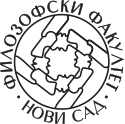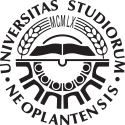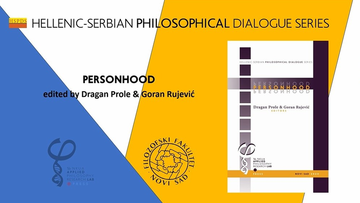Hellenic - Serbian Philosophical Dialogue II
GeneralThe motives for bringing about this series of Hellenico-Serbian dialogues originate from the sentiment that mutual relations between Greeks and Sebs far surpass the cultural exchange between Greece and Serbia. Knowing that cooperation does not simply fall into one's lap, but must be initiated by human will and energy, a group of philosophers from Athens and Novi Sad, the proverbial "Athens of Serbia", committed themselves to improving this state of affairs, at least within the confines of their area of expertise, philosophy. None of this would be possible without Evangelos Protopapadakis and his perseverance in wanting to arrange cooperation with colleagues not only from Serbia, but from the entirety of Southeastern Europe. We would also like to take this opportunity to extend our gratitude to the Erasmus Plus Programme, which provided several years of financial support for student and staff exchange between the Department of Philosophy of the University of Novi Sad and the Department of Philosophy of the National and Kapodistrian University of Athens, thereby helping to stabilise this cooperation and turn it into a natural part of our workflow. It is our firm intent to carry out the promise of the title of this series in the following years. Instead of mere cooperation of two institutions, our aim is to facilitate an international dialogue that would involve a wide range of thinkers, regardless of their place of employment.
The topic of these second Proceedings is personhood, which was spured on by the need to investigate the condition of humanity in the twenty-first century. The Proceedings begin with George Arabatzis' text on the relationship between Byzantine and contemporary philosophy. The leitmotif is the Byzantine notion of prosopon, and the contemporary associate is Nietzsche with his idea of "Christian Platonism". Thematically similar is the paper of Una Popović, which deals with the notion of personhood in the works of St Augustine as read from the standpoint of young Heidegger, for whom the most interesting task would be to investigate the existential transformation of a pagan life into a Christian one. Georgis Butlas' article also compares a contemporary and a modern thinker. On the one hand is John Locke's question of relational identity of personality, on the other is Parfit's view that "identity doesn't matter to survival". Dragan Prole's text expounds upon Edmund Husserl's notion of personhood with the help of Nietzsche's notion of "egypticity", which points out the tendency of interpreting temporal phenomena as eternal and immutable. Although the two of them set off from fundamentally different presuppositions, it is soon shown that Nietzsche, the "philosopher of a hammer", and Husserl, the "philosopher of a strict science", produce strikingly similar notions of personhood. Panagiotis Kormas and Antonia Moutzouri investigate the tropes of Hellenistic (i.e. Stoic) understanding of man and contemporary neuroscience. The authors of the text present the lexicon of Hellenistic anthropology in comparison with models that emerged from contemporary studies of the human brain. The article by Damir Smiljanić presents his investigation of the phenomenon of personification, conducted along three main lanes: personification as categorial mistake, as categorial transfer and as hidden vivification. For this purpose, the following philosophical theories proved to be helpful: Ryle's logical analysis, Hartmann's new ontology and Klages' metaphysics of life. Alkis Gounaris and George Kosteletos penned an article motivated by the humanoid Sophia, the first artificially intelligent entity to become a citizen of Saudi Arabia. The perspective used by the authors positions the moral aspects of artificial intelligence front and center and proceeds with the idea that moral capacities presuppose a certain form of personhood. Marica Rajković investigates Jean-Paul Sartre's notion of personhood while pointing out the central role of notions of responsibility and possibility. The author amplifies Sartre's leading issue from the standpoint of the relation between existence and politics: if a man is zoon politikon, how is it possible that his fate is not resolved once and for all by gaining political freedom? The final text of the Proceedings is penned by Ioannis Ladas, wherein the notion of personhood is investigated from the standpoint of bioethics. The potential of bioethical understanding of personhood is seen in the complex bioethical approach to life and death decisions: the phenomena of abortion and euthanasia.
Dragan Prole and Goran Rujević


